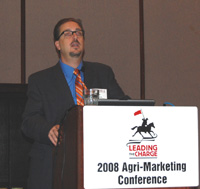If every car in America would use a ten percent blend of ethanol for one week, the amount of greenhouse gases produced in the U.S. would be reduced by nearly 1.3 billion pounds.
That is according to calculations done by life sciences researcher Nathan Danielson, president of BioCognito.
 “What we did was take some fairly complex modeling that was done by Argonne National Laboratory and distill it down to where it would mean something to the average consumer,” said Danielson. “We considered if you took E-10, E-85 and cellulosic ethanol and put it in a typical gas tank, what would the impact on the environment be.”
“What we did was take some fairly complex modeling that was done by Argonne National Laboratory and distill it down to where it would mean something to the average consumer,” said Danielson. “We considered if you took E-10, E-85 and cellulosic ethanol and put it in a typical gas tank, what would the impact on the environment be.”
Assuming a car with a 20 gallon gasoline tank, Danielson found that filling up with E10 can reduce greenhouse gas emissions by 9.5 pounds per tank.
“Ethanol is just a very good fuel for reducing overall carbon foot print,” Danielson said. “The story gets better if we go to E85. If we get to E85, all the sudden you are sitting at about 90 pounds of carbon dioxide that you’ve removed from the atmosphere by using ethanol instead of gasoline.” Everyone filling their tanks with E85, he says, would reduce greenhouse gas emissions by nearly 12.4 billion pounds in one week.
Better still, Danielson says that the same situation using ethanol derived from cellulose could reduce greenhouse gases by 282 pounds per car per week, or 38.5 billion pounds a week if used by every car on the road. He thinks that cellulosic ethanol will be “ready for prime time” within the next 5-7 years.
Joanna Schroeder with the Ethanol Promotion and Information Council says most average consumers can make a difference today by filling up with either E10, which can be used in virtually every gasoline powered car engine in America, or E85 in one of the 6.5 million flex-fuel vehicles on the road today, according to
“The great thing about using ethanol is you don’t have to wait to make an environmental impact,” Schroeder said. “Every single time you fill your tank with an ethanol-enriched fuel, you’re reducing greenhouse gas emissions.”


 According to research results announced at a press conference in the State Capitol, drivers in Missouri are expected to save an average of 9.8 cents per gallon this year due to the 10 percent ethanol standard that went into effect Jan. 1, 2008.
According to research results announced at a press conference in the State Capitol, drivers in Missouri are expected to save an average of 9.8 cents per gallon this year due to the 10 percent ethanol standard that went into effect Jan. 1, 2008.  KL Process Design Group was the first company to get a small-scale cellulosic ethanol plant on-line using waste-wood material to produce about 1.5 million gallons of ethanol a year. The company is currently providing teams in the American LeMans Series with an 85 percent cellulosic ethanol racing fuel.
KL Process Design Group was the first company to get a small-scale cellulosic ethanol plant on-line using waste-wood material to produce about 1.5 million gallons of ethanol a year. The company is currently providing teams in the American LeMans Series with an 85 percent cellulosic ethanol racing fuel.  A Canadian company says it has technology that will help shake loose more sugars from corn to make more ethanol and more oil from feedstocks, in particular algae, to make more biodiesel.
A Canadian company says it has technology that will help shake loose more sugars from corn to make more ethanol and more oil from feedstocks, in particular algae, to make more biodiesel. A new report from R.L. Polk & Co. says sales of hybrid vehicles rose 38 percent in 2007, compared to the previous year. The report also points out that better technologies and infrastructure are needed for ethanol- and biodiesel-powered vehicles to live up to their sales potential.
A new report from R.L. Polk & Co. says sales of hybrid vehicles rose 38 percent in 2007, compared to the previous year. The report also points out that better technologies and infrastructure are needed for ethanol- and biodiesel-powered vehicles to live up to their sales potential. Electric meters are running backwards as Rock Port, Missouri became the first town in the country to run on 100 percent wind power.
Electric meters are running backwards as Rock Port, Missouri became the first town in the country to run on 100 percent wind power. “Rock Port officially declared its energy independence today,” said Tom Carnahan, president of the St. Louis-based Wind Capital Group that brought the Loess Hills Wind Farm to fruition.
“Rock Port officially declared its energy independence today,” said Tom Carnahan, president of the St. Louis-based Wind Capital Group that brought the Loess Hills Wind Farm to fruition. A new analysis of America’s ethanol industry shows dramatic efficiency gains in ethanol production have been made in the last five years.
A new analysis of America’s ethanol industry shows dramatic efficiency gains in ethanol production have been made in the last five years.  “This is not your father’s ethanol industry anymore,” said
“This is not your father’s ethanol industry anymore,” said  Kentucky Governor Steve Beshear visited the headquarters of Alltech this weekend for the ribbon cutting of the company’s new Nutrigenomics Center. Alltech is an international company involved in a variety of enterprises from animal nutrition and biotechnology to horse racing and malt whiskey. The governor says everyone is very excited about Alltech’s new venture into biofuels.
Kentucky Governor Steve Beshear visited the headquarters of Alltech this weekend for the ribbon cutting of the company’s new Nutrigenomics Center. Alltech is an international company involved in a variety of enterprises from animal nutrition and biotechnology to horse racing and malt whiskey. The governor says everyone is very excited about Alltech’s new venture into biofuels. Alltech president Dr. Pearse Lyons says he was humbled to receive one of the three new DOE grants announced last week and he is confident about the project, which will cost an estimated $70 million. “In 15-18 months, we will be using what we call solid state fermentation to go forward cracking cellulose to ethanol,” said Lyons. “And we will use 30 percent corn stover or switchgrass.”
Alltech president Dr. Pearse Lyons says he was humbled to receive one of the three new DOE grants announced last week and he is confident about the project, which will cost an estimated $70 million. “In 15-18 months, we will be using what we call solid state fermentation to go forward cracking cellulose to ethanol,” said Lyons. “And we will use 30 percent corn stover or switchgrass.” Independent regional fuel distributor and specialty refiner Direct Fuels has opened a biodiesel facility at its Euliss refinery in North Texas.
Independent regional fuel distributor and specialty refiner Direct Fuels has opened a biodiesel facility at its Euliss refinery in North Texas. Biofuel maker Nova Biosource Fuels, Inc. has updated the progress on its Seneca, Illinois biodiesel plant.
Biofuel maker Nova Biosource Fuels, Inc. has updated the progress on its Seneca, Illinois biodiesel plant.